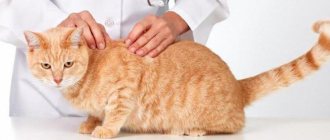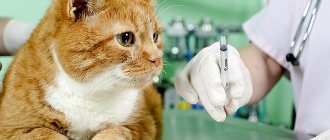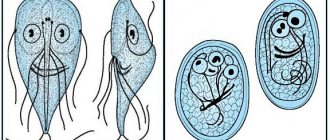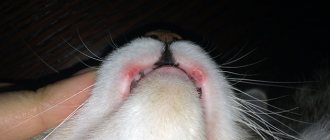What is deworming and why is it needed?
Deworming is measures aimed at destroying existing parasites or preventing their appearance. Worms are harmful not only to animals, but also to humans. For the safety of the whole family, it is important to prevent their appearance by all means.
For prevention purposes
Preventative treatment is carried out not only for those animals that constantly go outside, but also for couch potatoes. The likelihood of a pet becoming infected is lower, but it still exists. Risk factors include feeding with natural products, namely meat, fish and offal. Such food is often contaminated with parasites. The second source of danger is grass brought from the street.
Before vaccinations and travel
After vaccination, the immune system is weakened, since all its forces are aimed at fighting the introduced virus. A recently vaccinated animal is more vulnerable to helminths. Therefore, before vaccination, it must be dewormed.
Before going abroad, you will have to find out in advance how to properly deworm a cat. The mustachioed traveler will need a veterinary passport and veterinary certificate form No. 1. These documents contain notes on vaccinations and all anti-parasitic treatments. The certificate is issued on the basis of a veterinary passport, clinical examination, fluorescent diagnostics and the results of an analysis for helminths. Its validity period is only 5 days, so all necessary procedures are carried out in advance.
Pre-treatment will also be necessary for those who decide to go to the country. The likelihood of infection in nature is higher, and without additional protection, the pet runs the risk of acquiring parasites.
Deworming is mandatory for mature animals 2-4 weeks before mating. This is necessary to ensure that the expectant mother does not get helminthiasis - it is forbidden to treat a pregnant cat with almost all drugs. In addition, there is always a risk of infection of the offspring.
As a treatment
Infected pets are treated not once, but twice. The first time, anthelmintic drugs kill adult individuals, and the second time, they kill grown-up worms that have hatched from eggs.
Disease prevention
It is worth noting that you cannot completely protect your cat from parasites, but you can really reduce the risk of infection by following preventive measures:
- regular cat deworming;
- Take your cat to the veterinarian once every six months;
- eliminate sources of infection;
- exclude raw meat, fish, and tap water from the diet;
- protect the cat from other animals;
- Clean your cat's things (tray, bowl, toys) regularly.
By following these rules, you can protect not only your cat, but also yourself.
When and how often to worm a cat
Calculating how to properly deworm a cat is quite easy. To do this, you need to understand the purpose of the event:
- Prevention
. If the pet is kept at home, then it is treated 2 times a year. If access to the street is not limited, then an anthelmintic is given every quarter.
- Treatment
. The anthelmintic is given twice with a break of 10-14 days. Remember that the anthelmintic does not affect eggs.
The schedule can be shifted when traveling abroad or outdoors, undergoing surgery or vaccination, as well as participating in exhibitions. To avoid complications, including overdose, be sure to listen to the advice of your veterinarian and follow the basic rules.
Deworming rules
Antihelmintics are given an hour before morning feeding. This eliminates the interaction with gastric juice of increased acidity observed during digestion. Neglecting this recommendation may impair absorption or change the properties of the medicinal substance.
Due to the toxicity of the drugs, only healthy animals are allowed for treatment. Anthelmintics should be given with extreme caution to kittens and pregnant and lactating pets.
The dosage of the medicine depends on the weight of the pet, so read the instructions before use. To be safe, consult your veterinarian. He may advise you to adjust general recommendations depending on the patient's condition. Here it is better to play it safe: too small a dose will not give the desired effect, and too much will lead to intoxication.
It is important to check for flea infestation before use. Fleas quickly spread worm eggs, preventing recovery. Until they are eliminated, treatment will be pointless.
To strengthen the immune system, prebiotics are given along with anthelmintics - dietary fiber that stimulates the growth of beneficial bacteria in the intestines. When carrying out a procedure for therapeutic purposes, be sure to get tested after repeated treatment and take care of more thorough hygiene of the tray.
Types of helminths in cats
In order to properly deworm a cat, it is necessary to find out what type of worms it is affected by. This issue is solely within the competence of the veterinarian. Only he can determine the type of parasite, prescribe adequate treatment and select appropriate medications.
The most common types of endoparasites:
- Roundworms: roundworms, hookworms, nematodes. The small intestine is affected. This type of worm is most common in cats. Even newborn kittens can become infected with them through their mother's milk. Adult cats become infected through feces. These worms secrete a toxin that poisons the animal's body. They block the bile ducts, affecting the heart and lungs. They lay eggs around the anus, which causes unbearable itching.
- Tapeworms (flatworms) are cestodes. Cats can become infected with them through raw meat. Fleas can also be carriers of cestodes. Their habitat is the intestines. The “family” of these worms is a ribbon up to 70 cm long, which consists of segments with larvae. Some parts may be passed out in the stool. These worms often cause intestinal obstruction, which often leads to the death of the animal.
- Flukes are trematodes. The most dangerous worms, the main “tool” of which is powerful suction cups. With their help, flukes are able to gain a foothold in the heart, lungs, and liver and suck the life out of these organs. Flukes cause diseases such as paragonimiasis and opisthorchiasis. Sources of infection can be raw fish and untreated water.
Features of some groups of animals
Toxins in anthelmintics poison not only worms, but also the cat’s body. True, in the latter case, toxic substances do not have a significant effect. The danger arises only with low immunity, which is typical for sick animals and kittens. The drug will have to be taken with extreme caution during pregnancy and lactation, since all substances from the body are transferred to fragile babies.
In kittens
The first treatment of a kitten is carried out no earlier than three weeks of age. After this, it is processed quarterly, deviating from the schedule only before vaccination. Vaccinations are given starting from 2-3 months, followed by revaccination after 15-30 days. 10 days before vaccination, the baby is dewormed.
The selection of the drug and dosage is made by the veterinarian.
In pregnant and lactating females
Most anthelmintic drugs have a negative effect on embryos, causing abnormalities in their development and causing miscarriages. Veterinarians recommend treatment no later than 10 days before mating. This rids the pet of existing parasites in advance and gives her immunity from the appearance of new ones until the end of feeding.
If you are behind schedule, be sure to make an appointment at the veterinary clinic and find out how to deworm a pregnant cat. In the third trimester, taking medications is at its most dangerous, so it may be necessary to reduce the dosage indicated in the instructions.
Expectant mothers are given low-toxic anthelmintics: Drontal, Profender and Dirofen. The ban includes Polyvercan, Prazitel and Kanikquantel Plus. Their effect on the body is too aggressive and can lead to unpleasant consequences. In the absence of serious symptoms and maintaining good health, you can limit yourself to taking folk remedies.
With nursing pets, things are also not so simple. The first month of drug treatment should be avoided. When infected, babies are temporarily separated from their mother. In the second month after birth, you can take certain medications prescribed by your veterinarian.
What drugs exist
Preparations intended for deworming cats come in narrow and broad spectrum. The former affect a specific type of parasite, while the latter affect several at once.
Thanks to the variety of release forms, the anthelmintic can be easily selected individually. It can be given in the form of tablets or suspensions, or simply dripped onto the withers. Each form has its own advantages and disadvantages. After reading them, you will understand how easier it is to deworm your cat.
Pills
The advantages of the tablet form are a longer shelf life and the possibility of localizing the action of the drug in a specific part of the gastrointestinal tract. This is achieved by applying a special coating that allows the active substance to be transported to the required location.
The downside of such medications is their slow action and the impossibility of use for frequent bouts of vomiting. The owners also have problems with feeding the tablets. Because of the bitter taste, animals often refuse to take them on their own, so the procedure is carried out forcibly.
Suspensions
First of all, suspensions are attractive due to their fast action. When the active substances are crushed, their surface area increases, allowing contact with a larger part of the organ or tissue infected with worms.
Another advantage is a more pleasant taste, which is achieved in production using flavoring agents. The taste of meat is accepted with a bang by mustachioed pets. Suspensions are often produced together with a dispenser syringe, which allows you to measure the required amount of medicine and inject it into the cat’s mouth.
If you have several pets, then treat them with one drug, choosing a convenient release form.
The disadvantages of suspensions include short service life and physical instability. The resulting sediment disrupts the uniformity of dosing.
Drops
Drops are applied only to the withers - a place that the animal cannot reach. To get the effect, just a couple of drops are enough, so owners choose this form because of its economical consumption and ease of use.
Swimming is excluded for 2 days before and after use. Water can wash away the protective barrier on the skin or the droplets themselves. In the first case, the pet will receive more toxins, and in the second, it will not feel the effect and will remain vulnerable to worms.
Please note that due to their gentle action, drops are not suitable for direct infestations. If helminthiasis is detected, it is recommended to use other anthelmintics, and the drops will act as a protective agent after getting rid of the worms.
Folk remedies
Traditional medicine is recommended for young people, pregnancy and lactation. It has no harmful effects on the body and is suitable even for weakened pets. Its only drawback is its slow action. Treatment will take from 7 to 30 days. There is also a risk of an allergic reaction.
To remove worms use:
- Infusion of wormwood and tansy. Grind the plants in equal proportions, pour boiling water over them and filter to remove small particles. For 1 tbsp. l. 250 ml of water is enough. The cooled infusion is taken an hour before morning feeding for 7 days.
- Pumpkin seed infusion. Pour boiling water over the peeled and crushed seeds, adding a little honey. After 12 hours, strain the infusion and serve half an hour before meals. The medicine can be given orally or through enemas.
- Tansy flowers. In addition to the green part, the buds themselves also have healing properties. Add peppermint, buckthorn bark and wild carrot seeds. Prepare the same way with tansy and wormwood, taking 2 times more herbal mixture. Give it three times a day for 3 days.
Before using folk remedies, be sure to consult your veterinarian. Some recipes may be dangerous.
It is strictly forbidden to use onions and garlic. These products contain chemicals that destroy feline red blood cells. Hemolytic anemia may be added to helminthiasis. Poisoning by these plants is accompanied by severe vomiting, diarrhea, pale mucous membranes and difficulty breathing.
Tips and tricks
Deworming is a process that requires not only the correct choice of product, but also compliance with the dosage and timing of use. An overdose of anthelmintic drugs, as a rule, is not observed, but pregnant pets, as well as very small pets, are at risk. The main signs of an overdose include the appearance of convulsions and foam at the mouth, as well as tremors of the limbs and disruption of the respiratory system.
How many days to worm and how often
It is best to give anthelmintic drugs to cats in the morning, on an empty stomach, about an hour before the animal eats food. For the purpose of prevention, deworming is performed in pets starting from the age of one month. Such manipulations are usually carried out four times a year. It is necessary to deworm cats that have contact with street animals and are often walked approximately once a month.
Important! It should be remembered that adult animals are more resistant to helminths, so anthelmintics can be used once every six months.
When performing planned preventive or therapeutic deworming, the specifics of such an event must be taken into account. The drug is capable of destroying adult helminths, but has no effect on their eggs, so it is mandatory to re-administer the drug after ten days.
Before starting deworming, you must read the instructions and strictly adhere to the dosage recommended by the manufacturer.
How to worm kittens correctly
Kittens are dewormed only after the pet reaches three weeks of age. In the future, preventive deworming is carried out four times a year, as well as ten days before scheduled vaccination. For therapeutic purposes, treatment of kittens and removal of helminths is carried out according to indications. A severe degree of worm infestation in kittens requires repeated treatment ten days after the initial deworming.
This is interesting! As practice shows, overdose and severe side effects in kittens are observed when using drugs intended to rid adult pets of worms.
Currently, manufacturers produce drugs containing one main active component, which counteracts only a certain type of worms, as well as products based on a whole complex of active substances that help destroy various types of internal parasites. It is best to use drugs for deworming kittens that have a broad spectrum of action on all or many types, as well as the stages of development of helminths.
Is it possible to worm a pregnant cat?
A pregnant cat must be rid of helminths if the presence of such parasites disrupts the natural processes of growth and development of future offspring. The following are the most dangerous and severe signs of a cat being infected with worms during pregnancy:
- no appetite;
- the general condition of the pet noticeably deteriorates;
- There is an abundance of helminths in the feces.
If the cat, despite the presence of worms, looks cheerful and quite healthy, and also has a good appetite, then it is advisable to hold off on using anthelmintic drugs, since many such drugs cause miscarriage or the appearance of various severe congenital deformities in kittens. Deworming drugs are especially dangerous in the last third of pregnancy.
However, despite the proven harm of most antiparasitic drugs, if necessary, their use is completely justified and advisable. In this case, preference should be given to drugs whose active substance is characterized by low toxicity levels:
- "Drontal";
- "Dirofen";
- "Profender".
Highly toxic antiparasitic drugs such as Kanikvantel Plus, Prazitel and Polyvercan, which have a teratogenic and embryotoxic effect on the animal’s body, are strictly prohibited for use during pregnancy.
Important! Before choosing a remedy for deworming a pregnant cat, it is advisable to obtain qualified medical advice, and also carry out all therapeutic measures under the supervision of a veterinarian.
Is it possible to worm a nursing cat?
The presence of worms of any kind in the body of a pet is very dangerous, especially for a nursing cat . In the process of growth and vital activity, helminths release harmful substances that cause quite severe intoxication of the body.
As a result of such chronic poisoning, various allergic reactions often develop, and the liver tissue, which is forced to utilize toxins, also experiences a great negative impact.
Among other things, parasites in an animal’s body negatively affect the functioning of the heart and kidneys, and tapeworms cause intestinal obstruction or death of the animal. However, immediately after the birth of kittens, giving the cat special medications intended to kill helminths is strictly prohibited. The deworming procedure can be performed no earlier than four weeks after birth.
This is interesting! The best-proven complex preparations are Aziprin, Kanikvantel Plus, Dirofen and Pratel, as well as the sweet suspension for adult cats Prazitsid and Drontal.
Anthelmintic before vaccination
Kittens undergo their first vaccination at the age of two or three months, and a second vaccination is performed after another three weeks. Before vaccination is carried out, deworming must be performed. For this purpose, you can use the following well-proven anthelmintics:
- "Prasitel";
- "Polyverkan";
- "Dirofen";
- "Kaniquantel plus";
- "Dironet";
- "Profender";
- "Alben-S";
- "Azinox Plus";
- "Milbemax";
- "Milprazone."
After deworming, it is very important to give your pet special medications that contain a sufficient amount of prebiotics, or dietary fiber. This drug, fermented in the pet’s intestinal tract, will serve as the main food for developing beneficial microflora, and also stimulates and strengthens the immune system.
Return to content
How to give your cat medicine
Inexperienced owners often struggle trying to figure out how to deworm a cat that refuses medication. Not for the first time, spit out tablets gradually dissolve due to saliva, but still do not reach their destination. A frightened animal hides in the farthest corner and prevents any attempts to extract it from there.
This situation can be avoided if you think through everything in advance. The most important thing is to eliminate as much as possible all the exciting moments:
- Do not open medications in the presence of your pet. Measure out the required dose of tablet or suspension before the cat arrives.
- Wait for the right moment. It is easier to act in a state of rest or strong fascination with another object. Try gently waking your sleeping pet or giving him a pill when he persistently asks for food.
If you can’t do everything quickly, secure the cat on your lap with a blanket or towel, leaving only the head free. Gently open your jaws and place the tablet on the root of your tongue. After this, close your mouth and stroke your pet’s neck, provoking the swallowing reflex.
For the most aggressive and persistent, it is recommended to make a decoy by wrapping the tablet in a tasty piece of minced meat or cottage cheese. The medicine can also be crushed, mixed with water and served as a suspension.
A suspension or paste is more readily accepted by many animals, but there can be problems here too. If you are not yet comfortable with the deworming procedure, carry it out with the help of a second person. Later, you will learn how to quickly and deftly give your cat medicine.
Can deworming cause harm?
Complications can occur if the dosage is incorrect. An insufficient amount of the substance will keep the worms alive - they will continue to multiply and poison the body, which will affect the worsening of symptoms.
If kittens are overdosed or dewormed with adult medications, vomiting and diarrhea may occur. Gastrointestinal upset severely dehydrates the body, so animals will need the help of a veterinarian. Prolonged diarrhea in adult animals is safe for no more than 2 days, and in kittens – only 6-12 hours.
If you are hypersensitive to the active substances, itching or other allergic reactions, including anaphylactic shock, may occur. Other possible complications include:
- breathing problems (shortness of breath);
- blood pressure surges;
- excessive salivation and foaming (due to the bitterness of the medicine);
- stomach bleeding and kidney dysfunction;
- rapid weight loss.
In severe cases of helminthiasis and an excessively weakened body, taking anthelmintics can lead to multiple organ failure syndrome. This deadly pathology leads to rapid failure of all internal organs and systems. It is impossible to save an animal with such a diagnosis, so veterinarians recommend a full diagnosis before deworming in severe cases.
First symptoms of infection
Typically, the signs of the presence of helminths in the body are very similar to an infectious disease. Therefore, it is not recommended to carry out treatment without consulting a veterinarian. Here are some symptoms that indicate the presence of worms in a cat's body:
- constipation or diarrhea;
- the appearance of vomiting;
- dark stool;
- weight loss;
- there is blood or mucus in the stool;
- hard breath;
- the cat gets tired quite quickly, lethargic, weak;
- there is a decrease or increase in appetite;
- cough;
- bloating in the abdominal area;
- the appearance of helminths in feces;
- the appearance of seizures (more severe form);
- A pregnant cat may go into premature labor.











